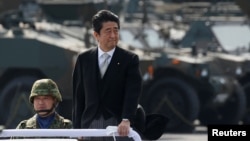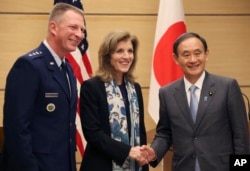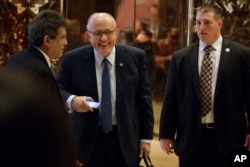U.S. President-elect Donald Trump met Thursday with key advisers and candidates for top jobs in his new government and planned for talks later with his first foreign visitor, Japanese Prime Minister Shinzo Abe.
The president-elect, working out of his Trump Tower skyscraper in New York, also scheduled talks with former U.S. Secretary of State Henry Kissinger, the country's top diplomat in the 1970s, and was meeting with South Carolina Governor Nikki Haley, a possible choice for secretary of state when Trump assumes power January 20.
Trump has been focusing on his national security appointments this week, while also considering his choices for other Cabinet positions, but, his decisions on whom to name did not appear imminent.
Trump campaign manager Kellyanne Conway said some appointments could be named before Thanksgiving on November 24, but maybe not.
"It's Donald Trump and Donald Trump alone who makes the ultimate decisions," she told one television interviewer.
Since winning election last week, Trump has spoken by phone with a number of world leaders, including Egyptian President Abdel Fattah el-Sissi, German Chancellor Angela Merkel and Russian President Vladimir Putin. But the talks with Abe will be the first in-person meeting for Trump.
Building trust
Before departing Japan, Abe said he wanted to use the meeting to discuss his vision for the future with Trump.
"The alliance only works based on trust. So I would like to build that trust with President Trump, and based on that I would like to work together with him toward world peace and prosperity," he said.
During his campaign, Trump questioned several bedrocks of the U.S.-Japanese relationship, suggesting that the U.S. was doing too much to provide defense to Japan. He floated the idea of allowing Japan and others in the region to have nuclear weapons and forcing higher payments to support the deployment of U.S. forces in those countries.
The U.S. has about 53,000 military personnel based in Japan along with 43,000 dependent family members and 5,000 Defense Department civilian employees.
Supporters of the defense alliance argue that beyond the benefits to Japan, there are strategic gains for the U.S. by having its forces deployed in that part of the world.
"Prime Minister Abe will definitely talk about the importance of the Japan-U.S. alliance and that alliance is not only for Japan and the United States, but also for the entire Indo-Pacific region as well as world politics," Abe adviser Katsuyuki Kawai told Reuters.
The Trump transition team also sent its first set of people to various government agencies to get up to speed on their operations. Spokesman Sean Spicer said that included teams to the State Department, Pentagon, Justice Department and National Security Council.
Next week, teams will be announced focusing on economic policy, domestic policy and independent agencies.
Lobbying ban
Spicer told journalists that all those named to visit the agencies would sign the transition team's form banning them from being a registered lobbyist for five years after leaving government service.
In addition to talks with Abe, Haley and Kissinger, Trump was set to meet with Florida Governor Rick Scott and Texas Representative Jeb Hensarling.
U.S. media accounts have described levels of turmoil in the discussions after Trump aides pushed out two of his national security advisers. But Trump insisted the process was "going so smoothly" and that only he knew who finalists for various Cabinet positions were.
Former U.S. Ambassador to the U.N. John Bolton and former New York City Mayor Rudy Giuliani were also said to be under consideration for the post of secretary of state.






